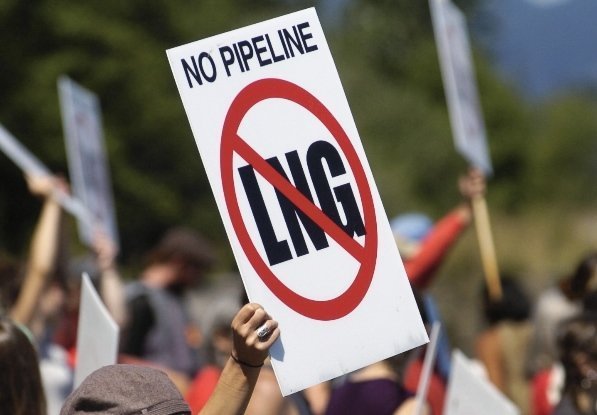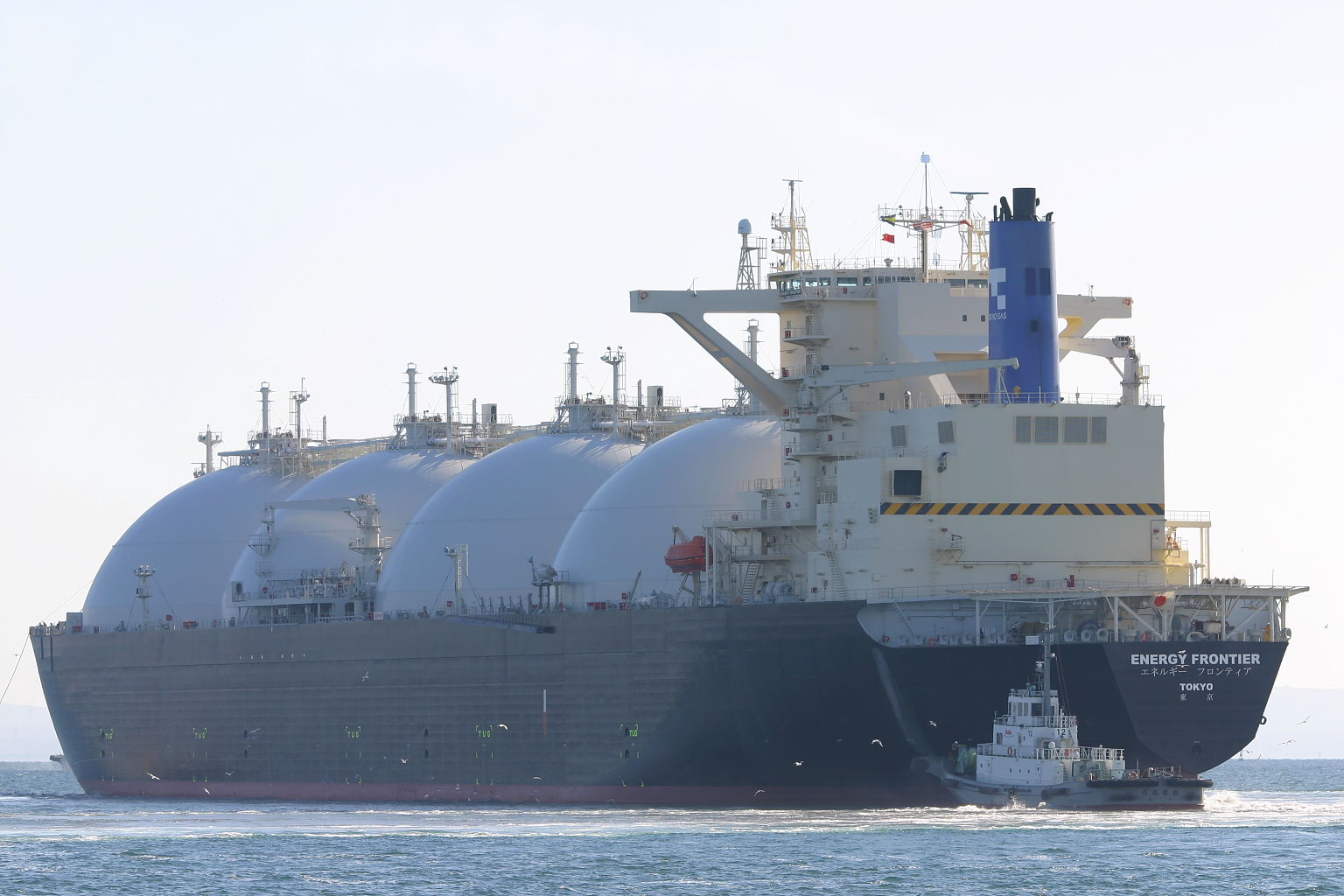In the whirlwind of deregulation and corporate jubilance surrounding President Donald Trump, Canada-based Veresen Inc. hopes to find some new wind in its sails.
Veresen is the money behind the long-running effort to export liquefied natural gas (LNG) from the coast of Southern Oregon in Coos Bay. Its plans were dealt a serious blow last March when the Federal Energy Regulatory Commission denied key permits, marking the first time the agency has ever denied permits for LNG. In December, the agency declined to reconsider its decision, and shortly after, Veresen withdrew its proposal for the South Dunes power plant, which had been proposed to liquefy and cool gas for storage and shipment after passing through the proposed Pacific Connector Pipeline.
Now, with a president who is warm to the fossil fuel industry, the company says it’s still in the game.
“I think with a little help from the White House, we’ll be able to get there,” CEO Don Althoff said after a March 10 meeting with White House economic adviser Gary Cohn.
And residents of Coos County will be looking at an initiative to push back.
In May, Coos County voters will consider a first-of-its-kind law that would ban the export of liquefied natural gas from the county by prohibiting fossil fuel transportation that is not intended for local use. This follows dozens of communities that have passed local laws aimed to protect their water from fracking, and it could make Coos County the first to prevent such fracked gas from leaving North America for sale on a foreign market.
In a Feb. 10 news release, Jordan Cove LNG said it pre-filed for a new application with FERC. Informational open houses will be held March 21 through 24.
Two major problems highlighted in FERC’s March 2016 rejection were the lack of confirmed LNG buyers and unclear access to the pipeline’s right of way in the 230 miles between Malin and Coos Bay. In fact, much of this right of way is being occupied by property owners who have no interest in a pipeline negotiation. According to the FERC letter, the company obtained only 4.7 percent of the right-of-way easement and 2.8 percent of the total construction easement. Meanwhile, eminent domain could be used on 630 landowners to make way for the Pacific Connector Pipeline. Fifty-four of those landowners actively intervened in the FERC process to object to the pipeline. At a Feb. 24 town hall in Ashland, U.S. Sen. Ron Wyden publicly opposed the use of eminent domain for the pipeline and called for a ban on both its use and the threat of its use for the Pacific Connector Pipeline.
“The first we heard of it was when we found flagging on our property,” said Deb Evans, a property owner in Klamath County. “The more research we did, the more crazy the project seemed.”
After refusing an offer to sell an easement to the company, Evans began working with other landowners to hike the path of the pipeline and document the effects it would have on their property and the environment.
“Part of our success is just connecting with other landowners and asking them what they wanted,” Evans said. “Hike the Pipe really helped us do that. To do this day, we know hundreds of landowners throughout the pipeline route.”
One of the people Evans met was Stacey McLaughlin, a landowner in Douglas County* who had reforested 357 acres of logged-over land that had been littered with old electronics and appliances. What bothers McLoughlin most is the idea of heavy construction and an explosive pipeline running through 400 rivers and streams between Maupin and Coos Bay.
They can’t mitigate that, she said. “You cannot go into that South Umpqua River and do horizontal drilling, drilling under it, or the Rogue River, and say you’re not going to impact that. They don’t even mitigate where the impacts happen – they mitigate other places. How does it help me or my community to have the negative impacts to the South Umpqua River mitigated at the South Dunes golf course in Bandon? It doesn’t benefit the endangered species or our community. They’ll be leaving Southern Oregon an environmental crime scene.”
Concern from property owners has also been echoed by the Klamath Tribes, which submitted a letter to the State Historic Preservation Officer on Sept. 21. The letter outlines concerns that the project could affect former village sites and unearth human remains, as well as damage river resources, as the pipe is routed under the Klamath River and Rogue River, “which since time immemorial have been and continue to be important sources of fish for Tribal members.”
“There’s other things we didn’t really talk about in the letter,” said Don Gentry, chairman of The Klamath Tribes. “Maintaining a healthy ecosystem is really something that we see as key. We’re here because the fish were here. We’re here because the system was healthy. I guess that’s just a value we have; that’s inherent in our legends and stories; that’s been kind of passed down to us through the ages. So we see that there’s a need to do things differently than what we’ve had. And we support looking at alternative sources of energy. We’ve actually been looking at solar projects.”
Many opponents are incensed by news that the project is returning despite the unprecedented rejection from FERC last year.
“Southern Oregonians have demonstrated, year after year, that we don’t want this pipeline and export terminal,” said Hannah Sohl, director of Rogue Climate, one of the local organizations opposed to Jordan Cove LNG.
“It’s a never-ending nightmare,” McLaughlin said. “When Veresen can’t meet their time frames, they simply extend those time frames – over and over and over again. The state of Oregon permits this. We can’t compete with their lawyers and their endless checkbook.”
And as Veresen travels to Washington, D.C., to curry favor with the White House, its opponents in Oregon have begun appealing directly to voters.
“Essentially sustainability is illegal,” said Mary Geddry**, of the Coos Commons Protection Council, the group backing the initiative to ban LNG from the county. “You see that with DAPL (Dakota Access Pipeline): It’s criminal to protect water, but it’s perfectly legal to poison it. If we’re not gonna be able to say no to harmful industrial projects, then effectively sustainability is illegal. So our ordinance is designed to legalize sustainability in Coos County, and to refuse to recognize corporations as persons.”
The ordinance would also address one of the most contentious aspects of the Jordan Cove project – the company’s use of eminent domain to seize land for their pipeline.
The backers of LNG exports are not in favor of the proposal.
“In short, we’re against the community bill of rights,” said Michael Hinrichs, a spokesperson for Jordan Cove LNG. “Yes, it would impact Jordan Cove, but it impacts Coos County far beyond that, and I think a majority of residents in Coos County are gonna show just that in May.
“It’s wildly unconstitutional,” Hinrichs added. “I’m personally of the mind that it would be struck down in the courts afterward.”
Methane and climate change
Climate change has been a major piece of the controversy around LNG.
“Southern Oregon has been seeing these climate effects more than other parts of the state, maybe more so than Portland,” Evans said. Deadly wildfires in Southern Oregon and water shortages in Ashland have forced many people to reckon with the reality of climate change, she said.
“Until we saw it at our door, we didn’t really realize what was happening. That’s when we realized we need to get over this fossil fuel stuff,” Evans said. “I sort of see it as a showdown between the oil and gas industry and everyone else.”
But Jordan Cove’s backers say natural gas is different than other fossil fuels.
“It’s always odd to be out in the community and have it assumed that I’m a right-wing fossil fuel guy from Texas who loves Trump and works for a company like Exxon-Mobil,” Hinrichs said. “That couldn’t be further from the truth. And I think it catches people off guard when they find out that I’m a card-carrying Democrat, and so is the CEO of Jordan Cove, and that we believe in global warming and are happy to talk about it. The difference between Jordan Cove and Exxon is not even worth discussing because of how different we are.”
Hinrichs argues that gas from Jordan Cove will provide a clean-burning fuel that will displace coal in places like India so that they can avoid the kind of air pollution that’s plagued China. He said the company also has two customers in Japan that will avoid increased reliance on coal generation thanks to gas they hope to obtain from Jordan Cove.
Burning coal emits more carbon dioxide than natural gas. However, methane, the main component of natural gas, has a much greater global warming potential in the short term. According to the Intergovernmental Panel on Climate Change, the warming effect of methane is 86 times as potent as carbon dioxide over a 20-year period, and 34 times as strong over a 100-year period.
“Even a tiny, tiny percentage of methane leakage makes its impact much worse than carbon dioxide,” said Ted Gleichman, a policy adviser at the Center for Sustainable Economy.
As a result of short-term problems such as heat waves, rising ocean temperatures and loss of snow pack, some scientists are urging public officials to immediately regulate the most potent short-term drivers of climate change – particularly methane and black carbon.
But since the fracking boom in the mid-2000s, policymakers have mainly assumed that natural gas was a clean investment – a position that’s now coming under serious strain.
“There is no fossil fuel solution to the fossil fuel crisis,” Gleichman said. “We are actually now at a point where it is cost effective to build the just transition. And it’s really imperative that gas is not seen as a ‘bridge’ to that transition. As Mike Brune said a few years ago, it’s not a bridge; it’s a gangplank. Liberal Democrats, many of whom are labor-oriented, many of whom are corporate-oriented, need to understand that their grassroots constituents have left them behind on these issues, and they cannot support a Trump energy program, which is what LNG has become in Oregon. There will be primary fights if people don’t turn.”
Jordan Cove pipeline open houses
All open houses will be held from 4 to 8 p.m.:
March 21: North Bend – The Mill Casino (3201 Tremont St.)
March 22: Canyonville – Seven Feathers Casino (146 Chief Miwaleta Lane )
March 23: Medford – Ramada Inn Conference Center (2250 Biddle Road)
March 24: Klamath Falls – Oregon Institute of Technology (3201 Campus Drive, Mount Mazama Room)
CORRECTIONS:
*Stacey McLaughlin is a Douglas County landowner. Her county and the spelling of her name have been corrected.
**The spelling of Mary Geddry's name has been corrected.



